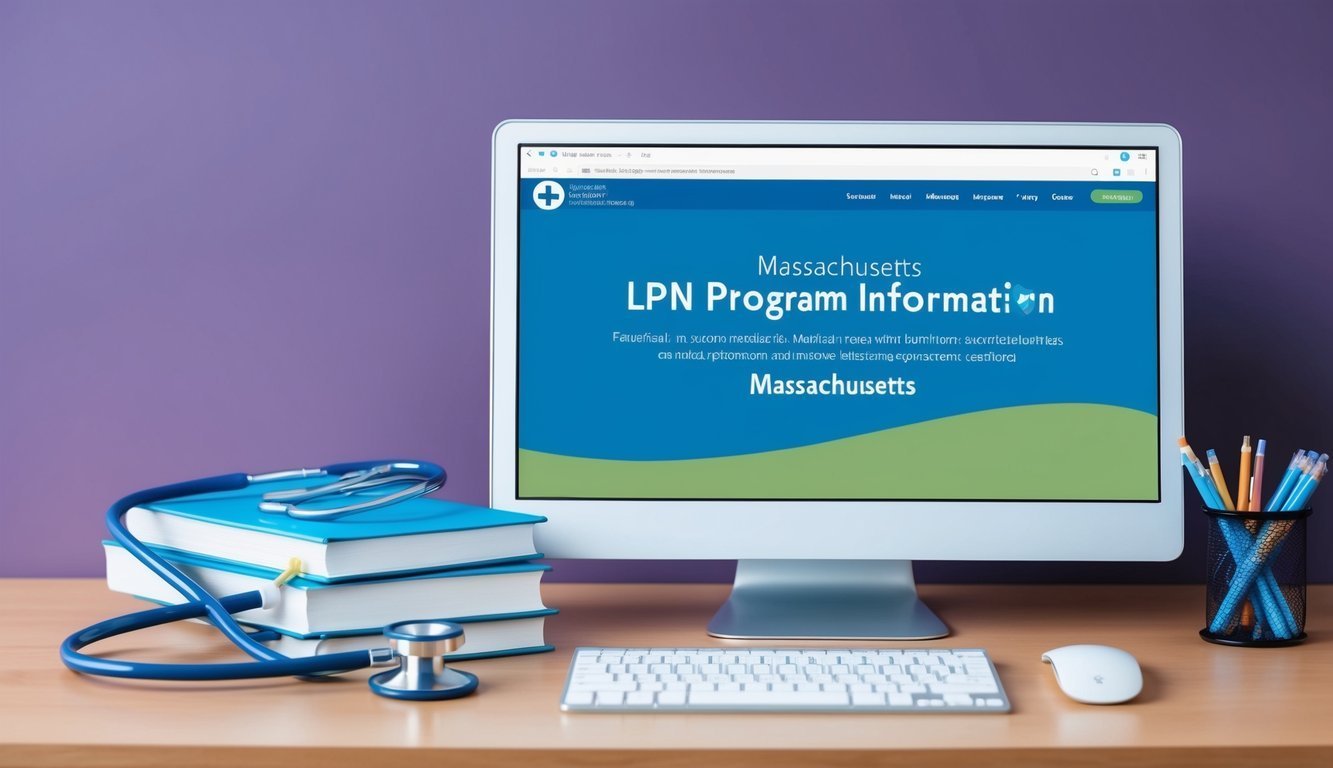Choosing the right path to become a Licensed Practical Nurse (LPN) in Massachusetts can set you on a rewarding career journey. LPN programs in MA provide comprehensive training that prepares you for a crucial role in healthcare. In these programs, you will deliver essential patient care under the supervision of registered nurses and doctors.
With various options available, including both online and campus-based programs, you can find a schedule that fits your lifestyle.
To gain your LPN license, you will need to complete an accredited program, pass the NCLEX-PN exam, and meet state requirements set by the Massachusetts Board of Registration in Nursing.
This process includes hands-on clinical experiences that build your skills and confidence.
As you explore available programs, consider how they can advance your career, providing opportunities for further education and specialization in nursing.
The journey doesn’t stop at becoming an LPN; many graduates find lucrative career paths and the potential for growth within the nursing field.
Understanding the financial aspects and available resources can help you make informed choices as you embark on this fulfilling career.
Key Takeaways
- LPN programs in Massachusetts offer structured training and practical experience.
- Passing the NCLEX-PN is essential for obtaining your LPN license.
- Career advancement opportunities are available after becoming an LPN.
Understanding the LPN Role

As a Licensed Practical Nurse (LPN), you play a vital role in patient care within various healthcare settings.
Your responsibilities span from direct patient interaction to essential support in nursing tasks.
Here, we will explore the scope of LPN practice, the differences between LPN and RN responsibilities, and the various work environments available to you.
Scope of LPN Practice
The scope of practice for LPNs includes fundamental nursing care tasks.
You are responsible for monitoring patient vital signs, administering medications, and assisting with daily activities like bathing and feeding.
Key functions include:
- Patient Assessment: You observe and report changes in patient conditions.
- Wound Care: You provide basic wound care and dressings.
- Documentation: Accurately document patient care and treatment progress.
Your role is often defined by state regulations, which guide the specific duties you can perform.
For detailed guidelines, you may consult resources like the LPN Scope of Practice.
LPN vs RN Responsibilities
While LPNs and Registered Nurses (RNs) share some duties, there are key differences in responsibilities.
RNs typically handle more complex nursing tasks, including:
- Patient Care Planning: RNs develop comprehensive care plans.
- Advanced Procedures: RNs perform more advanced medical procedures and assessments.
- Supervision: RNs supervise LPNs and nursing aides.
As an LPN, you focus on direct patient care and support.
Your role is crucial in maintaining patient comfort and safety, but you work under the supervision of RNs or physicians.
Work Environments and Healthcare Facilities
LPNs have the opportunity to work in diverse healthcare settings.
Common workplaces include:
- Nursing Homes: Providing care for elderly residents.
- Home Health: Delivering care to patients in their homes.
- Extended Care Facilities: Assisting patients needing long-term care.
Each environment presents unique challenges and rewards.
For instance, in home health care, you have the chance to build strong relationships with patients.
In nursing homes, teamwork is essential for quality care.
Choosing the right setting influences your job satisfaction and career growth in the nursing field.
Requirements for LPN Programs in MA

To enroll in an LPN program in Massachusetts, you must meet several important requirements.
These include specific prerequisites, program accreditation, and licensing criteria to ensure you are prepared for a successful nursing career.
Prerequisites and Qualifications
Before applying for an LPN program, you should have a high school diploma or GED.
Many schools also require a minimum GPA, usually around 2.5 or higher.
You may need to pass an entrance exam, such as the TEAS (Test of Essential Academic Skills).
This test measures basic math, science, reading, and English skills.
Additionally, some programs ask for letters of recommendation or a personal statement.
Research each program’s specific qualifications for admission to ensure you meet their criteria.
Accreditation and State Approval
Accreditation is essential for LPN programs in Massachusetts.
Programs must be accredited by the Accreditation Commission for Education in Nursing (ACEN) or similar organizations.
This ensures the program meets high educational standards.
Programs must also be approved by the Massachusetts Board of Registration in Nursing.
This approval is crucial for your education to be recognized when applying for licensure.
Always verify that the program you choose has the required accreditation and state approval to protect your investment in your education.
LPN Licensing Requirements
Upon completion of the LPN program, you need to obtain a license to practice.
The key steps include:
-
Passing the NCLEX-PN Exam: This exam assesses your knowledge and skills as a practical nurse.
-
Submitting an Application: You will need to apply for licensure through the Massachusetts Board of Registration in Nursing.
-
Background Check: A criminal background check is part of the process. Ensure your record reflects your eligibility to practice nursing.
-
CPR Certification: Most programs require current CPR certification as part of the curriculum. This indicates you’re trained to handle emergencies in clinical settings.
By meeting these requirements, you position yourself for success in your nursing career in Massachusetts.
LPN Educational Pathway

Becoming a Licensed Practical Nurse (LPN) involves a structured educational pathway.
This includes specific coursework, practical clinical experience, and options for online or traditional programs.
Each of these elements is essential for preparing you for a successful nursing career.
Curriculum and Coursework
In an LPN program, you will complete a series of focused courses.
These are often part of a Practical Nursing Certificate program.
Common subjects include:
- Nursing Fundamentals: Introduces basic nursing skills and patient care.
- Pharmacology: Covers medication administration and drug interactions.
- Nursing Theory: Provides a foundation in nursing concepts and practices.
Courses are designed to equip you with essential knowledge and skills.
You can expect to engage in both classroom instruction and hands-on learning.
This combination ensures you are prepared for real-world scenarios in healthcare settings.
Clinical Experience
Clinical practice is a vital component of LPN education.
You will spend time in various healthcare environments, such as hospitals and nursing homes.
Here, you will apply the skills learned in your coursework.
During these clinical rotations, you will gain experience in:
- Patient assessment
- Basic care tasks
- Communication with healthcare teams
These experiences help build your confidence and competence as a nurse.
Programs typically require a specific number of hours in clinical settings to ensure that you meet the licensing requirements.
Online vs Traditional Programs
Both online and traditional LPN programs have unique benefits.
An online program offers flexibility, allowing you to balance your studies with work or other responsibilities.
You can complete theoretical coursework at your own pace.
Traditional programs usually emphasize hands-on learning with direct access to instructors and peers.
This can be advantageous for those who prefer structured classroom environments and immediate feedback.
When choosing your path, consider factors such as your learning style, schedule, and the specific requirements of programs like those at Mount Wachusett or Northern Essex Community College.
Exam Preparation and NCLEX-PN

Preparing for the NCLEX-PN exam is vital for becoming a licensed practical nurse.
You need to understand effective study methods, test-taking strategies, and be aware of pass rates to better gauge your readiness.
Studying for the NCLEX-PN Exam
Start by gathering study materials that fit your learning style.
Consider using NCLEX-PN review books, online courses, and practice questions.
Many students find practice exams helpful for identifying weak areas.
Make a study schedule that breaks down the content into manageable sections.
Focus on key topics such as nursing fundamentals, pharmacology, and patient care.
Resources like LPN 101 can provide additional support and practice tests.
Incorporate flashcards to reinforce important concepts.
Regularly reviewing your notes will help solidify your knowledge.
Test Taking Strategies
Before the exam, familiarize yourself with the test format.
The NCLEX-PN consists of multiple-choice questions, and you will face a mix of scenarios.
Use the process of elimination for tricky questions.
If you can eliminate one or two choices, your odds of guessing correctly increase.
Stay calm during the exam.
Take deep breaths and move on if you get stuck on a question.
Returning later with a fresh mind can help.
Remember that you can skip questions and revisit them at the end.
Understanding NCLEX-PN Pass Rates
The NCLEX-PN pass rate is a key indicator of program effectiveness.
In Massachusetts, the average pass rate for LPN candidates is around 80-90%.
Knowing these rates helps you understand program quality.
Higher pass rates generally indicate strong preparation for the exam.
You can check the latest statistics from the National Council of State Boards of Nursing to get the most accurate pass rates.
Use this information to determine which programs offer the best support for your success.
Career Advancement and Opportunities

As a Licensed Practical Nurse (LPN), you have several paths to advance your career.
Opportunities for growth include enhancing your skills, transitioning to higher roles, and pursuing specialized training.
Each option can help you improve your job prospects and earning potential.
Job Outlook for LPNs
The job outlook for LPNs is promising, especially in states like Massachusetts.
According to data from the U.S. Bureau of Labor Statistics, employment for LPNs is expected to grow by 9% between 2020 and 2030.
This demand is driven by an aging population and the need for healthcare services.
In Massachusetts, LPN salaries are competitive.
The average annual salary for LPNs is around $57,000, with higher potential in metropolitan areas.
In addition, certain healthcare settings may offer bonuses or higher pay rates for specialized skills.
Advancing from LPN to RN
Transitioning from LPN to Registered Nurse (RN) opens up new opportunities in the nursing field.
RNs typically have higher responsibilities and salaries.
You can pursue an ADN (Associate Degree in Nursing) or a BSN (Bachelor of Science in Nursing) to qualify for RN licensure.
Many institutions offer bridge programs designed for LPNs.
These programs acknowledge your existing training and experience, enabling a smoother transition.
RNs can expect higher pay, with average salaries around $84,000 in Massachusetts, along with greater responsibilities in patient care and leadership.
Continuing Education and Specializations
As an LPN, you need to participate in workshops, seminars, or additional coursework to stay current with healthcare practices.
Continuing education is crucial for career advancement.
You can also specialize in areas like pediatrics, geriatrics, or wound care.
Specializations often lead to better job opportunities and pay.
In Massachusetts, LPNs can pursue certifications in various areas to enhance their roles.
Finding suitable courses is easier with resources such as the Nursing Process or Nursing Track.
Financial Considerations
When pursuing an LPN program in Massachusetts, it’s crucial to understand the financial aspects.
Key points include tuition and fees, available financial aid, and effective expense planning.
Tuition and Fees
Tuition for LPN programs in Massachusetts can vary significantly based on the institution.
Costs typically range from $10,000 to $30,000.
This amount usually includes tuition for classes, instructional materials, and clinical supplies.
Here’s a breakdown of potential costs:
| Expense Type | Estimated Cost |
|---|---|
| Tuition | $10,000 – $30,000 |
| Books and Supplies | $1,000 – $2,000 |
| Lab Fees | $300 – $800 |
| Clinical Equipment | $100 – $500 |
Be sure to check the specific program at institutions like Massachusetts Bay Community College to get exact figures.
Financial Aid and Scholarships
Many students qualify for financial aid to help cover the costs of their LPN programs.
Options include federal aid, state grants, and scholarships.
The following resources can assist you:
- FAFSA: Completing the Free Application for Federal Student Aid is essential for federal loans and grants.
- State Aid Programs: Massachusetts offers various financial aid programs for residents. Check Massachusetts Office of Student Financial Assistance for details.
- Institutional Scholarships: Many colleges provide scholarships specifically for nursing students. Check with your chosen school for available opportunities.
Applying for scholarships early can greatly reduce your financial burden.
Expense Planning
Careful expense planning can help you manage your budget while in an LPN program.
Here are some tips to consider:
- Create a Budget: Track all income and expenses. Include tuition, books, supplies, and living costs.
- Consider Part-Time Work: Many students take on part-time jobs to offset living expenses. Look for flexible work options that fit around your class schedule.
- Explore Payment Plans: Some colleges offer payment plans that allow you to spread tuition costs over time. Check with your school for options.
Using these strategies can help you stay on top of your financial situation while pursuing your nursing career.
Frequently Asked Questions
Many prospective students have questions about LPN programs in Massachusetts.
This section addresses key inquiries regarding requirements, program duration, evening options, online coursework, costs, and how to find accredited programs.
What are the requirements for enrolling in an LPN program in Massachusetts?
To enroll in an LPN program, you typically need to have a high school diploma or GED.
Some programs may also require specific prerequisites, such as math and science courses.
Additionally, you may need to pass a background check and provide proof of immunizations.
How long is the duration of an LPN program in Massachusetts?
LPN programs in Massachusetts usually take about 12 to 18 months to complete.
Most programs combine classroom instruction with hands-on clinical practice.
The total duration may vary depending on the institution and whether you choose full-time or part-time enrollment.
What are the options for evening LPN programs in Massachusetts?
Several schools in Massachusetts offer evening or weekend LPN programs to accommodate working students.
These programs allow you to attend classes after your regular work hours.
Check with local community colleges or vocational schools for specific availability.
Can I complete an LPN program in Massachusetts through online coursework?
Yes, some LPN programs in Massachusetts offer online coursework for theoretical components.
However, you’ll still need to complete in-person clinical training.
It’s important to ensure that any online program is accredited and meets state requirements.
What are the costs involved in pursuing an LPN program in Massachusetts?
The cost of LPN programs can vary widely.
Tuition may range from $10,000 to $20,000 depending on the institution.
Additional expenses include books, uniforms, and licensing fees.
It’s advisable to check with individual schools for detailed cost breakdowns.
How do I find accredited LPN programs in Massachusetts?
You can find accredited LPN programs by visiting the Massachusetts Board of Registration in Nursing website.
They provide a list of approved programs.
Additionally, schools may display their accreditation status on their official websites.

